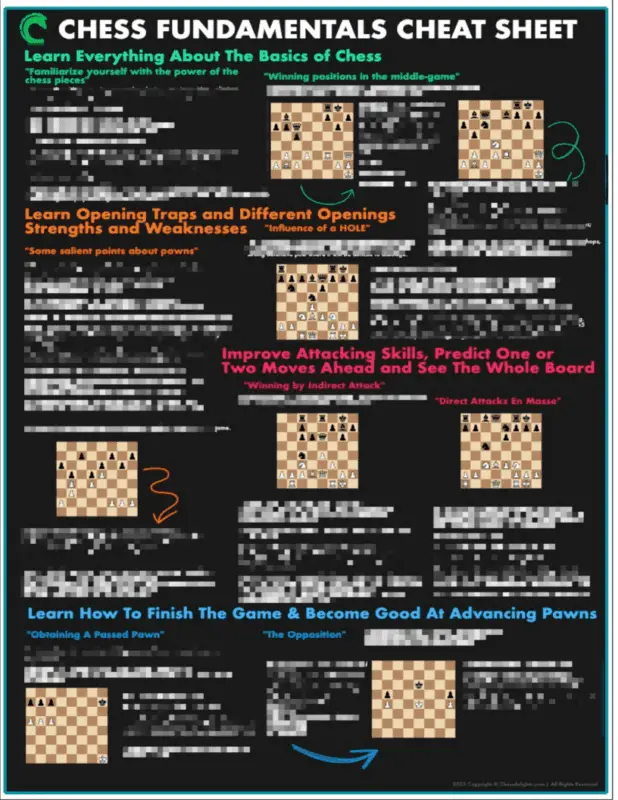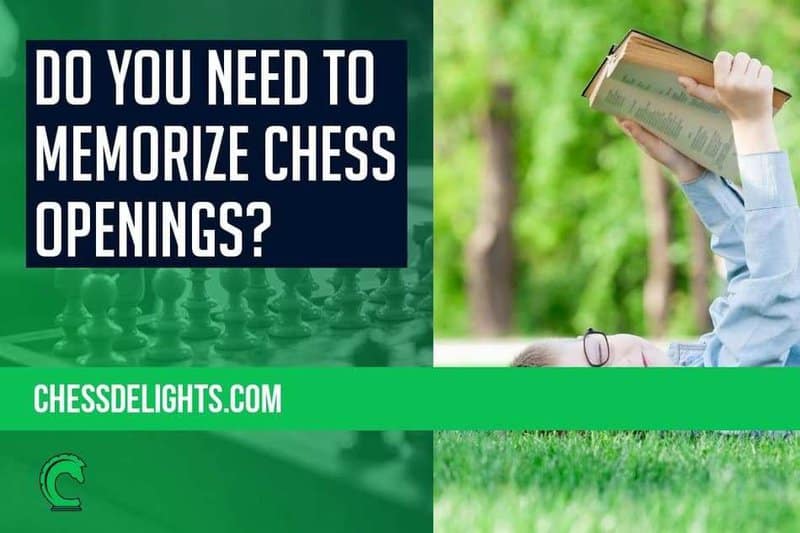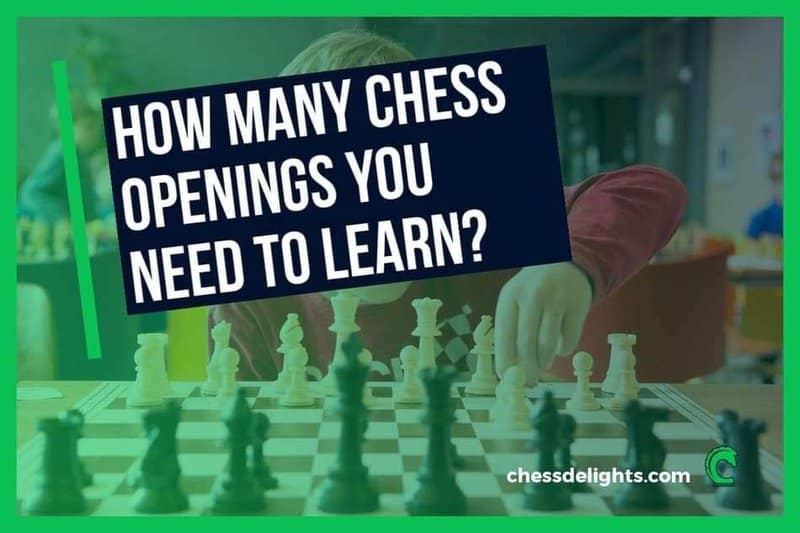Memorization and chess openings, have you ever considered memorizing chess openings?
I can't stress enough how important the opening is in chess. Those first few moves on the board aren't going to win you the game, but they are going to dictate the entire course of the game.
Getting an early advantage is the difference between having the upper hand and having to defend for the rest of the game.
We all know that defending for your life is so unpleasant in chess, we'd much rather be on the attacking side. Getting an advantage isn't chance or luck though, it knows how to outplay your opponent in the opening.
This is why mastering the chess opening is a must if you want to improve in chess. In this article, we are going to find out if we need to memorize openings and what beginners should know…
Do you need to memorize chess openings?
Yes! Playing well in the opening is going to make all the difference. It's going to take a lot of studying for you to memorize opening lines, but it is going to be worth it.
You are going to have an enormous advantage over any opponent if you can force them into positions where they have to defend.
If you watch grandmasters play, you will see just how much emphasis they put on studying openings.
Before a tournament, they study and memorize so many opening lines just to get a slight advantage moving into the middlegame.
They consider the main lines, but they also study deviations and novelties that they can use to surprise their opponent.
If you could see into the brain of a grandmaster, you will see so many opening lines memorized in there.
This is why they can play up to 20 moves without having to think because they've already studied beforehand what they're doing!
Also, read our article about “tips on improving your middle game“
For us as beginners or newbie chess players, we can't memorize all the opening lines.
This does not, however, mean that we shouldn't try.
Even if we can't remember all the nuances, memorizing the main moves, ideas, and traps are going to give you a significant advantage.
Not only will remembering an opening give you a better position, but it will also allow you to play much faster.
The time that you save for knowing the best moves beforehand can be crucial later on in your classical games.
And in blitz and bullet, this is very often the difference between winning and losing.
Is the Chess Opening Just Memorization?
So you decide to look up some openings. What will you see?
You will see a bunch of moves and move orders.
For example, you will see that the Spanish game goes 1. e4, e5 2. Nf3, Nc6 3. Bb5, and black can respond with a6, Nf6, d6, or any number of options. You'll see that if black plays d6 here, then white should play d4, but if black chooses Nf6, then the most popular response is to castle O-O. If black wants a6, white usually plays Ba4; this is the mainline, and it often goes on like 4… Nf6, 5. O-O, Be7 6. Re1, b5 7. Bb3, O-O… But what if white goes with 4. Bxc6, dxc6 5. Nxe5? Is black just giving up a pawn for free?
No, this is considered to be a wrong move for white. All black needs to do is to play 5. Qd4 and can recapture the pawn and be in a better position on the next move.
That is just an idea of the things you have to memorize when learning an opening.
You shouldn't only know the main lines, but also how to punish your opponents if they make inferior moves.
When you want to learn an opening, you are going to have to memorize so many lines and variations.
So is that all there is to mastering a chess opening?
Is the only thing you have to do is memorize a bunch of lines? While memorizing a bunch of different lines is useful, that is only half of what it takes to master an opening.
The other, and the more important, half of mastering an opening is knowing the ideas behind the moves.
If you know what moves to make, but don't know why you are making them, this won't do you much good.
The opening is only the first stage of the game. If you don't understand the ideas behind your moves, by the time you've finished your memorized lines, you will be clueless what to do next.
Not only that, but you can't possibly remember every single variation because there are millions of them.
If your opponent plays a move that you haven't looked up, you will, once again, be clueless what to do next.
This is why learning an opening is more than just memorizing lines.
That is very important for sure, but you need to know the ideas behind every move you make. This way, your moves will make sense to you.
Even when the game deviates from the lines you have studied, you won't be completely lost because you understand what you are trying to do.
So when you consider openings, don't just look at the moves and remember them, Make sure you also grasp what the moves you play are trying to accomplish.
Also, read article about “how many chess openings you need to learn?“
How to learn Chess Openings?
Now that you know that openings are more than just memorizing lines, how exactly do you learn an opening? Do you have to study every single possibility in every position carefully?
Do you have to do an extensive analysis of why certain moves are inferior to others by yourself?
This is indeed the nature of studying an opening, but you don't have to do this yourself. Today, you have a load of invaluable resources at your fingertips.
Chess is more than a thousand years old already. Over the years, brilliant minds have done all the hard work for us.
These are the people who pioneered the openings and ideas that are well-known in the chess world today. Thanks to these people, you don't have to create the ideas yourself, you just have to study their work.
The best way to learn an opening is by reading chess books.
Here, the author will not only show you the best moves, but he will also explain to you precisely what they do. You will also learn the various sidelines that might show up in your games.
And you will see how to punish your opponent immediately if they play wrong moves.
If you're not into reading, you will also find that there are dozens of chess video lessons that you can watch.
Either way, the best way to learn an opening is by studying the work of grandmasters of the past and present.
Another valuable resource you have is a chess database.
If there aren't any books that cover what you want to study, you can always look up what grandmasters have done in similar positions.
Grandmasters never play a move without reason. Every move they make has a lot of deep thought behind it.
Studying what they do in certain situations will not reveal to you everything they see in their head, but consider it carefully, and you will be able to find the main ideas behind their moves.
Copy these in your game, and you will become a much better player.
Also, read our article about “tips to get better at chess“
What opening should you memorize?
Openings are exciting to learn. However, you shouldn't get carried away and try to learn all the openings right away.
It's essential to have some idea of all the openings, but you should choose 2-3 openings to study in-depth. These will be your main weapons for battle.
Choosing which openings to study in-depth will be a personal choice.
You should choose openings that lead to the types of games you enjoy.
However, if you are just starting, I highly recommend studying the Spanish game.
This is the best opening to get you well-versed in the concepts of chess openings.
It follows the opening rules-of-thumb perfectly and also has a lot of in-depth studies done on it. Plus, this is the most popular opening in chess today, so you are sure to encounter this opening a lot.
Another great opening to memorize is the Sicilian defense.
I don't recommend beginner's playing 1. c5 as black, but you need to know how to respond if you are white and your opponent does this.
The Sicilian defense tends to lead to absolute mayhem, with tactics all over the board.
This is why you need to know the ideas and some of the common tactics that are involved.
This way, you can destroy anyone that tries to play the Sicilian against you.
Finally, my last recommendation would be the Queen's Gambit.
There are hundreds of variations of the Queen's Gambit. But most of the time, it is going to lead to a relatively quiet and positional game.
Learning how to play these types of openings will teach the importance of positioning your pieces optimally.
If you learn these 3 openings, you will already have an excellent opening repertoire.
But don't stop there, learn new lines in these openings, or take on a whole new opening. There is always something new to learn; this is what makes chess so exciting!
Wrapping Up
There you have it, if you are planning to learn or memorize chess openings!
This is the article to read… 🙂
By this time, you have an idea about the best chess openings for beginners and why memorization plays a considerable part in your early chess playing game.
I do hope you find this article helpful and hopefully was able to help you improve your chess game!
Till next time, have fun learning chess openings! 🙂
Hey, before you leave don't forget to check out our chess recommendations here.


